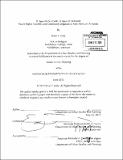| dc.contributor.advisor | Judith A. Layzer. | en_US |
| dc.contributor.author | Daly, Brian T. (Brian Thomas) | en_US |
| dc.contributor.other | Massachusetts Institute of Technology. Department of Urban Studies and Planning. | en_US |
| dc.coverage.spatial | n-us-nm | en_US |
| dc.date.accessioned | 2013-09-24T19:45:56Z | |
| dc.date.available | 2013-09-24T19:45:56Z | |
| dc.date.copyright | 2013 | en_US |
| dc.date.issued | 2013 | en_US |
| dc.identifier.uri | http://hdl.handle.net/1721.1/81148 | |
| dc.description | Thesis (M.C.P.)--Massachusetts Institute of Technology, Dept. of Urban Studies and Planning, 2013. | en_US |
| dc.description | Cataloged from PDF version of thesis. | en_US |
| dc.description | Includes bibliographical references (p. 57-60). | en_US |
| dc.description.abstract | Small farmers across New Mexico irrigate with acequias, a system of cooperative, gravity-fed ditches introduced in Spanish colonial times that remains well adapted to managing scarce water in a dry climate. While the acequia system has proven to be a self-sustaining means of managing common pool resources, it exists in tension with dominant legal doctrines that treat water as subject to tradable property rights. In recent decades, the growth of the state's urban areas has increased pressure on farmers to sell their water rights to urban developers. But because acequias are a cooperative system, transfers of their water rights threaten their ability to flexibly provide water for irrigation. Since 2003, state law has allowed acequias to rule on applications to transfer water out of the acequia and also to create "water banks" that protect individual water rights from loss to findings of non-use. To do so, however, an acequia must adopt changes to its bylaws and follow new procedures that can be complicated and unfamiliar. In the face of increasing pressure on rural water users to sell their rights and the varying governance practices of acequias, this thesis asks: how have New Mexico's laws equipped acequias to persist despite growing demand for their water rights? And to what extent are acequias taking the necessary steps to take advantage of their legal rights? I find that, when properly implemented, the powers granted by current law effectively empower acequias to resist the pressure of water markets, but that further efforts are needed to increase implementation of the measures. Through outreach, education, and the spread of innovative practices, acequias and their advocates can realize a powerful opportunity to restore community autonomy over water allocation. | en_US |
| dc.description.statementofresponsibility | by Brian T. Daly. | en_US |
| dc.format.extent | 60 p. | en_US |
| dc.language.iso | eng | en_US |
| dc.publisher | Massachusetts Institute of Technology | en_US |
| dc.rights | M.I.T. theses are protected by
copyright. They may be viewed from this source for any purpose, but
reproduction or distribution in any format is prohibited without written
permission. See provided URL for inquiries about permission. | en_US |
| dc.rights.uri | http://dspace.mit.edu/handle/1721.1/7582 | en_US |
| dc.subject | Urban Studies and Planning. | en_US |
| dc.title | El agua no se vende, el agua se defiende : water rights transfers and community irrigation in New Mexico's acequias | en_US |
| dc.title.alternative | Water rights transfers and community irrigation in New Mexico's acequias | en_US |
| dc.type | Thesis | en_US |
| dc.description.degree | M.C.P. | en_US |
| dc.contributor.department | Massachusetts Institute of Technology. Department of Urban Studies and Planning | |
| dc.identifier.oclc | 858401224 | en_US |
